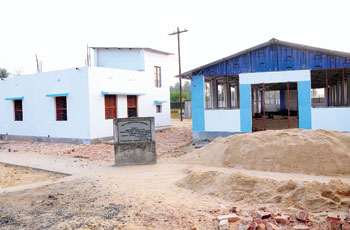
The Rs1-crore vermicomposting plant at Domjur’s Uttar Jhapardah
Garbage management is a huge issue throughout Howrah district, including the town and the suburban areas alike. While Howrah town has an overloaded trenching ground in Belgachhia where the mounting garbage is a cause of concern, the fringe areas of Howrah town, do not even have that. Most of the gram panchayats either dump domestic garbage on the nearby water bodies or on the vested lands causing pollution in the nearby areas. The problem is getting particularly acute in Domjur and Bally-Jagachha blocks, which are experiencing a population explosion in the last decade. With a view to finding a solution to the problem, Domjur Panchayat Samity has started implementing one of the biggest vermicomposting projects in Domjur’s Uttar Jhapardah, at a cost of Rs 1 crore. If everything goes well the vermicomposting plant will start functioning from the end of January.
“Initially, we have chosen five densely populated gram panchayats under Domjur Panchayat Samity, where garbage management is a problem. The accumulated garbage from these gram panchayats will be brought to the vermicomposting plant for breeding worms,” said Dipak Mukherjee of Domjur Panchayat Samity. He said that the vermicomposting project was part of Nirmal Bharat Mission.
“With rise in the price of land in Howrah town, people have started living in the suburban areas like Domjur, Salap and Bally-Jagachha. During the last one decade, these areas have become thickly populated leading to garbage accumulation. We are implementing the vermicomposting project with the twin aim of keeping the locality clean and solving the garbage disposal problem,” said Mukherjee. He said that the project was jointly funded by Howrah Zilla Parishad and the horticulture department of Howrah. The five gram panchayats from where garbage will be collected include Uttar Jhapardah, Dakshin Jhapardah, Domjur, Begri and Parbatipur.
According to the gram panchayats, an average of 700 families live in each gram panchayat that generate 175kg garbage. “An estimated total of 875kg of refuse will accumulate in five gram panchayats. We have arrived at this figure by assuming that each family will accumulate 250 grams of domestic garbage on an average everyday. But the quantity will rise during festive seasons and social ceremonies like marriage,” said one of the members of the Domjur gram panchayat.
Everyday, garbage from these gram panchayats will be brought to the plant. Besides, a huge amount of garbage will be brought from the vegetable and fish markets as well. Non-biodegradable waste like bottles, plastic and other things will be separated from the bio-degradable waste. While the plastics will be sold to the local agents through tenders, the bio-degradable waste will be used for producing compost. The waste will be put in small pits in which earthworms will be allowed to breed. The excreta of the earthworm is a good organic manure that can be used for growing organic vegetables.
“For the proper growth of the earthworms, only garbage is not enough. We have to put cow dung and rotten hyacinth in the pit for their proper growth. The employees of this plant will collect cow dung from the nearby cow sheds and hyacinth from the water bodies,” said Chandra Sekhar Rong, the superintendent of the vermicomposting plant. He said that there are a number of cow sheds in Moti Jheel area of Uttar Jhapardah where the project was located. “The cow dung from the cow sheds is now dumped in the nearby river or canals choking and polluting the water.

Garbage lining the streets in Domjur

The foundation stone of the vermicomposting plant

A canal choking up due to pollution. Pictures by Gopal Senapati
After we start collecting the cow dung, canals and rivers will stop getting polluted. This is another positive aspect of this project,” said Rong. In this connection, he narrated how the river Saraswati was polluted by dumping domestic garbage and cow dung.

Pits in this shed will breed earthworms that will feed on the rubbish and produce compost

A pit where cow dung and hyacinths will be dumped to make feed for the earthworms

The panchayat samity has decided to sell the compost to the local farmers for generating funds. “Compost is a good organic fertiliser for vegetables. There is a good demand for organic vegetables in our country. There are vast farmlands in and around Domjur Panchayat Samity. The farmers can earn considerable money by selling organic vegetables,” said Krishnendu Garui, former horticulture officer of Howrah and now the joint director of horticulture in Nadia’s Krishnagar. It was during his tenure in Howrah that the project was taken up.
Most of the panchayat samity members are optimistic about the success of the project. “It is not a profit-earning project. Its success can be measured in terms of employment generation and the kind of cleanliness we can offer in the residential areas through this project. We have decided to employ 30 persons in this project and we shall try hard to run this project on a no-profit no-loss basis,” said Tapan Chakraborty, district co-ordinator, Swachh Bharat Mission. He said that a preliminary study indicated that the residents of the five gram panchayats were ready to co-operate to make this project work.
“We have talked to the residents who have agreed to pay the gram panchayats Rs 20 to Rs 50 for collecting domestic garbage from their houses. The vendors of the vegetable and fish markets also agreed to pay,” said Chakraborty. He said that the panchayat samity will pay the salary of the persons employed in the vermi composting plant.











